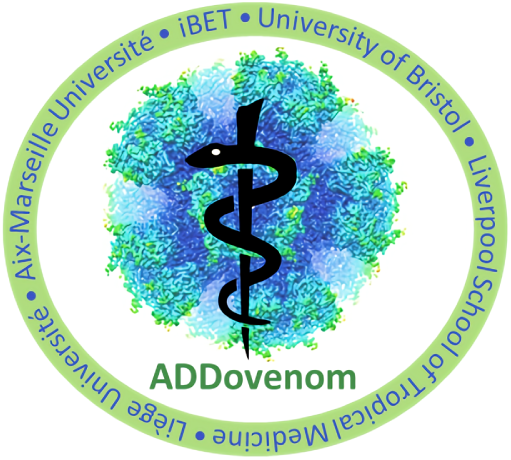ADDovenom researchers Fernanda Gobbi Amorim, Damien Redureau, Nicholas Casewell and Loïc Quinton have co-authored the following abstract, which has been submitted for the Venoms and Toxins 2021: The 8th International Toxinology Meeting (25 – 27 August 2021):
Next-generation sequencing for venomics: application of Multi-Enzymatic Limited Digestion for inventorying the snake venom arsenal
Multi-Enzymatic Limited Digestion (MELD) is a new methodology that applies synergic and time-limited digestion of multiple enzymes, representing a versatile yet straightforward approach for a new generation of proteomics methodology for defining venom composition. The generation of a higher number of peptides per protein during the MELD digestion increases the quality of protein sequencing and, consequently, identification. Herein we applied the MELD strategy for the venomics of two snake species: Echis ocellatus (EoV) and Dendroaspis polylepis (DpV). 10 µg of each venom were reduced/alkylated followed by two different digestion protocols: (1) trypsin and (2) MELD (Trypsin, GluC and Chymotrypsin). The digested materials were analysed in a Q-Exactive™ Plus Mass Spectrometer with protein identification performed by Peaks Studio X+. MELD showed more peptides/proteins identified for both venoms compared to the trypsin protocol. In EoV, 82.3% were identified as toxins and 17.2% as non-toxins, compared to the trypsin protocol which resulted in 69.2% toxins, 24% non-toxins and 6.9% for cellular components (CC). In DpV, MELD showed a coverage of 26.2% for toxins, 39.9% for non-toxins and 33.9% for CC, while for trypsin we obtained 23.3% for toxins, 37.4% for non-toxins and 39.3% for CC. MELD was able to identify new components in both venoms. 51% of the EoV were metalloproteinases (MP) while DpV showed a high content of nerve growth factor (22%). The highest number of mass spectras (MS) were obtained for MP (tr|Q2UXQ4) for EoV, in which MELD obtained 4-time more MS. For DpV, dendrotoxin I (P00979) showed the greatest number of MS, and trypsin yield 2-times more MS. MELD presented a different coverage according the presence of high molecular mass content in the venom arsenal. This strategy can be applied to identify new groups of venom components. It represents an innovative strategy for venomics, opening new perspectives for sequencing and inventorying the venom arsenal.
Fernanda Gobbi Amorim, Damien Redureau and Loïc Quinton are based at the Laboratory of Mass Spectrometry, MolSys Research Unit, University of Liège, Belgium; Nicholas Casewell at the Centre for Snakebite Research and Interventions, Liverpool School of Tropical Medicine, Pembroke Place, Liverpool, UK

